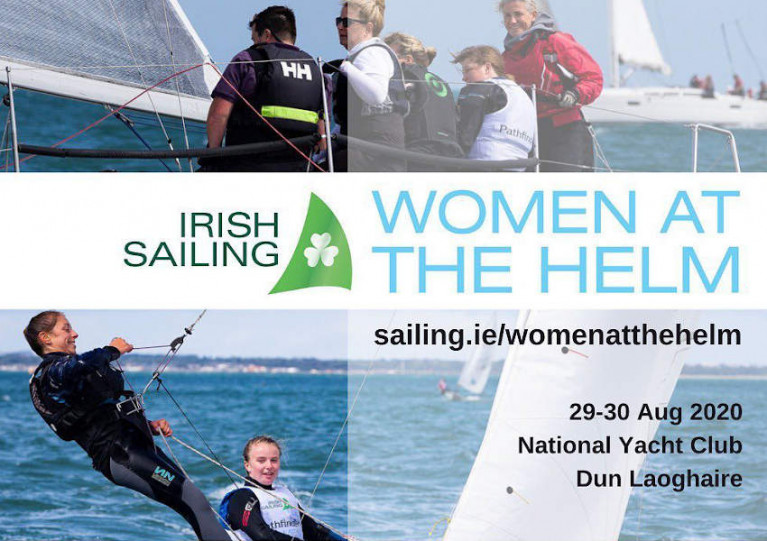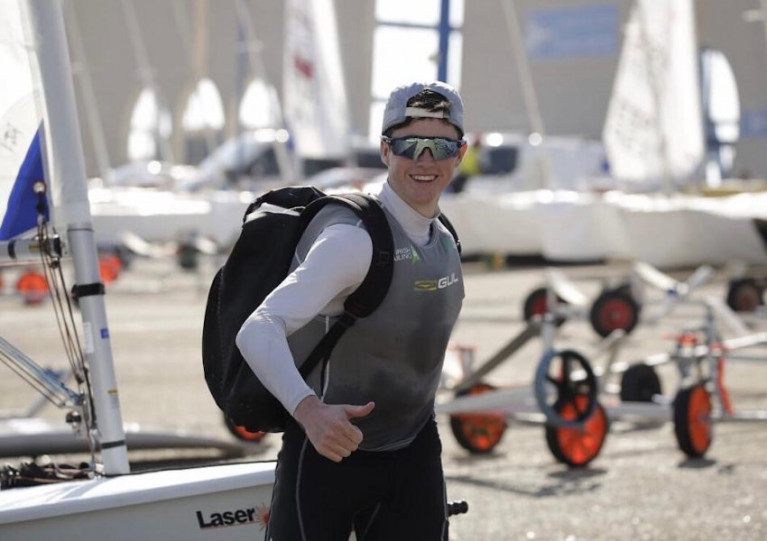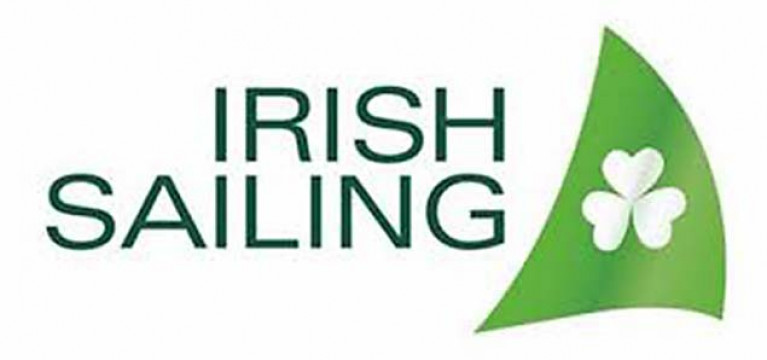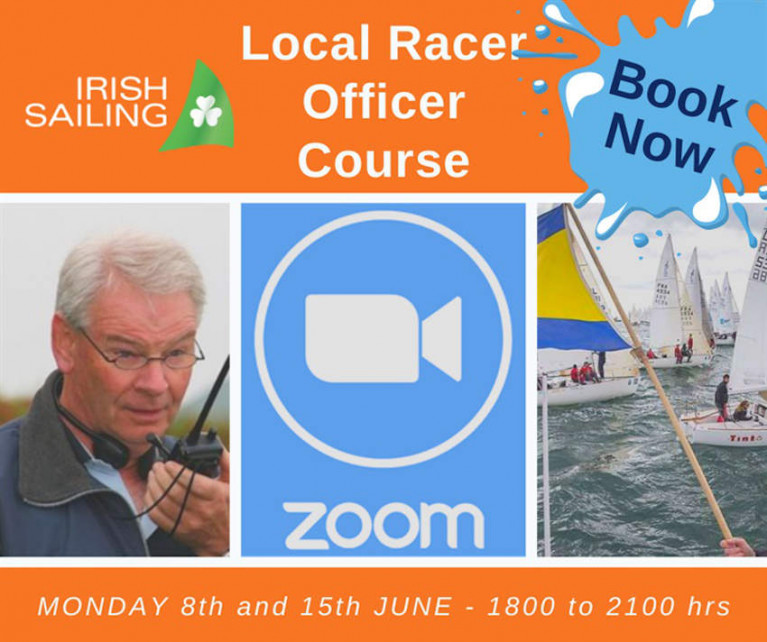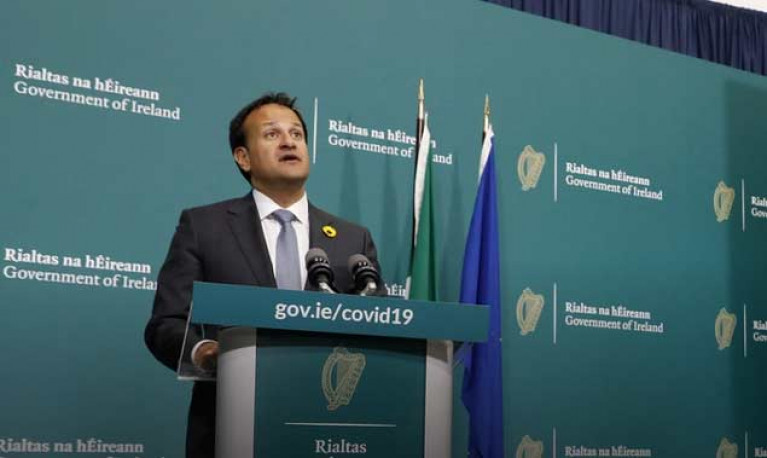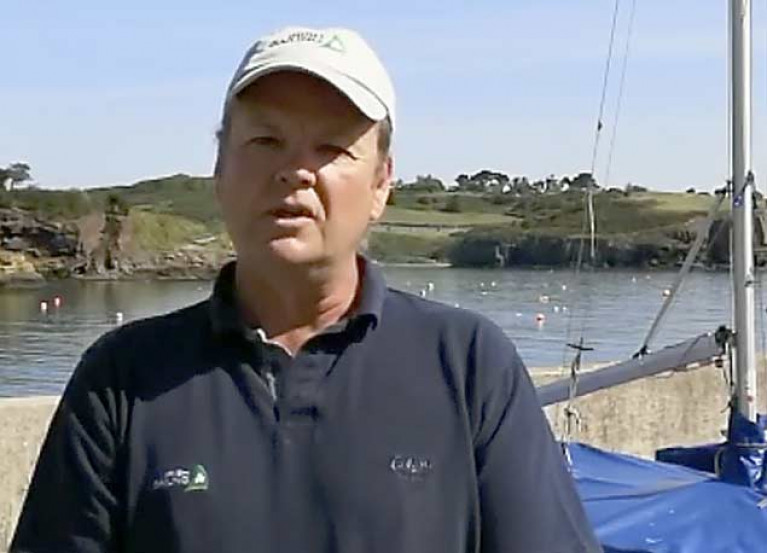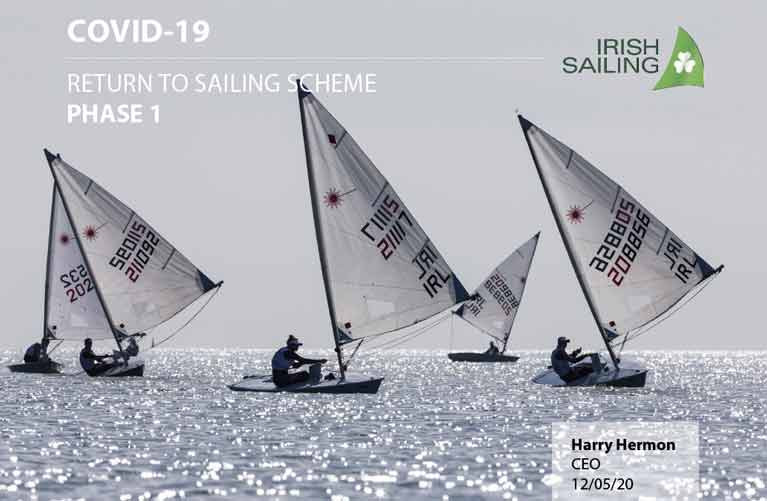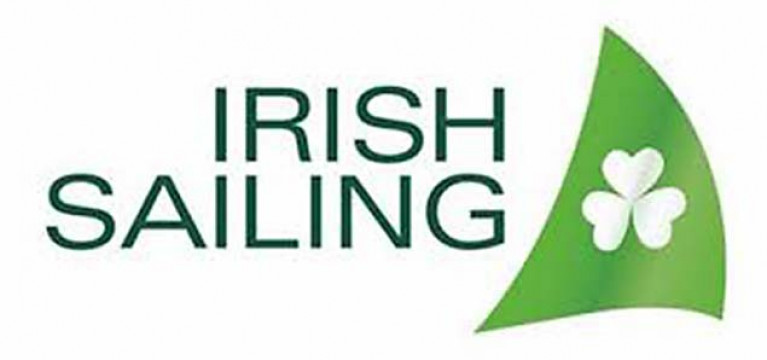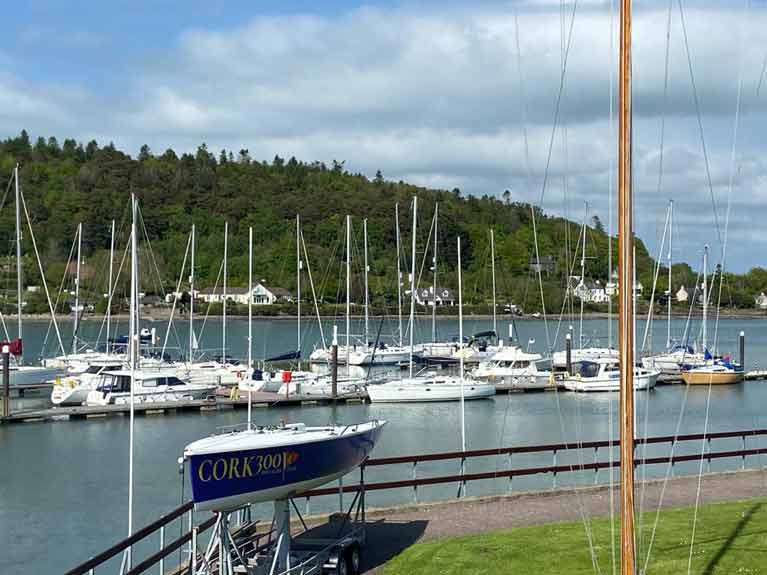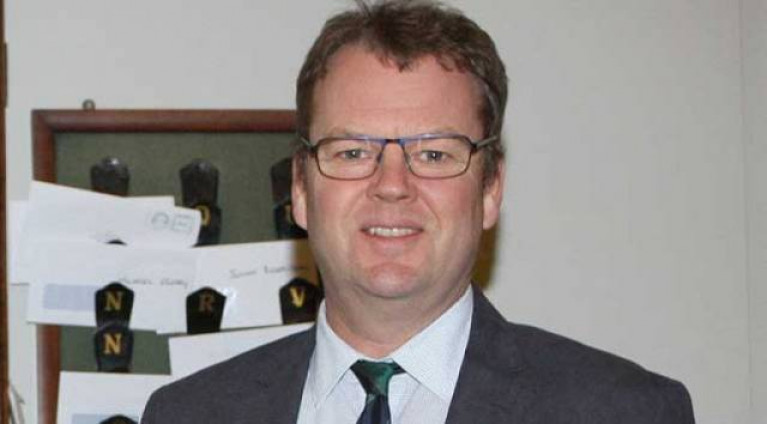Displaying items by tag: Irish Sailing
This event has now been cancelled over continued concerns surrounding Covid-19. For more see HERE.
The National Yacht Club has confirmed that its planned hosting of the Irish Sailing Women at the Helm National Regatta will go ahead as scheduled on 29-30 August.
Organisers are planning for a safe social and sailing environment and working within the Irish Sailing and Government guidelines to ensure the safety of all participants and volunteers, as well as the local community.
CANCELKLEDThe success of last year’s inaugural event at the NYC “shows what a great opportunity the regatta is to showcase the strength and leadership of women in sport and their ability to adapt in a changing environment”, the club said.
Women at the Helm aims to encourage women to move from shore to boat, crew to helm and club to regional event and generally to take on leadership roles in sailing.
The event is open to PY dinghy and keelboat racing from teens to seniors. Men are welcome to participate but crews must be at least 50% female and all boats must be helmed by women.
Expression of interest registration is now open, and sailors and volunteers can register their interest in helming, crewing, chartering or volunteering. The Notice of Race will be available shortly.
Irish Sailing has congratulated its Academy athlete Tom Higgins, who has received one of the prestigious Ad Astra Elite Sports Scholarships from UCD.
Nearly 400 school-leavers applied for the 15 Ad Astra Scholarship programme places.
The programme looks for “exceptional, high-achieving students” and allows them to study for their degree alongside the pursuit of their sporting goals, with both financial aid and additional supports such as academic mentoring and calendar rescheduling.
It means the athlete, who sails the Laser Radial out of the Royal St George, can balance big competitive events alongside college work without either suffering.
Higgins has completed his studies in Gonzaga College and is awaiting his predicted Leaving Certificate grades. He hopes to pursue a degree in the areas of business, commerce or law.
“The last three months have been strange,” he said. “When the schools first closed, I continued to hit the books, but obviously that all changed.”
He’s been training with the Irish Sailing Team on the water in Dun Laoghaire, and joins them in the video calls for strength and conditioning, cycling sessions and coaching classes.
He’s now looking ahead to the autumn: “We’ve got graduation in September, so I still feel connected with school. Then college starts, and I have the Laser Radial Youth European Championships in Hyeres [in France] at the end of October. It’ll be busy!”
Irish Sailing Waits for Sport Expert Group’s Response to Phase 3 & 4 Return to Sailing Proposal
Irish Sailing is waiting to hear back from the Government's Sport Expert Group to see if mixed household crew (in a pod system) and using regular crew with effective contact tracing as the mitigating factor will be allowed.
Irish Sailing has submitted the proposal for Phase 3 & 4 of the Return to Sailing Scheme and hopes to have a response early next week, along with an indication of the Government’s revised latest Roadmap.
Summer Camps
Although Government guidelines for organising children’s summer camps have been published it hasn’t specifically addressed any relaxation of social distancing measures.
Irish Sailing’s Local Race Officer Course Goes Online
Irish Sailing president — and National Race Officer — David O’Brien will present an online Local Race Officer Course starting Monday evening 8 June.
The course runs on two nights, Monday 8 and Monday 15 June from 6pm to 9pm, and is open to anyone (aged 16 and over) interested in how racing and committee boats work and would like to know more about becoming a recognised race officer.
The course will be delivered by the Zoom platform and costs just €10. For booking details see HERE.
Irish Sailing Issues “Return to Sailing Scheme” Phase 2
Taoiseach Leo Varadkar has announced that plans to ease coronavirus lockdown restrictions are being accelerated and the country will move to 'Phase 2 Plus' on Monday 8th June.
Irish Sailing, as the national governing body for the sport, has issued its “Phase 2 Return to Sailing Scheme” and it is available to download below.
The Phase 2 Scheme begins on Monday and outlines the measures to be put in place to ensure a safe return to the water, and also includes an updated Risk Assessment and FAQs document.
As regular Afloat readers will know, the sailing season got underway over the last few weeks with many boats now back in the water. Yacht racing, however, is not expected to resume until Phase 3 and only then among single-handers or members of the same household sailing together on the same boat.
Download the Return to Sailing Scheme phase 2 below.
The Government have established an ‘Expert Group’ with representatives from the Department, Sport Ireland and Sporting Bodies to help with consistency in the approach for returning to sport. Irish Sailing is now working with this group for clarity around the lifting of restrictions as we transition through the phases.
Sport Ireland has suggested that each organisation should appoint a COVID 19 Officer to help establish protocols for preventing the spread of the virus, and who would be Irish Sailing’s main point of contact in this area. To date, we have been communicating directly with sailing club Commodores and Centre Principles for the distribution of COVID 19 information, and unless any organisation provides details of a specific COVID 19 Officer, we will continue to liaise with the commodore/centre principle on COVID 19 matters.
The Expert Group have informed us that information and clarity around the Phases 2-5 will be published on a “phase by phase basis as the public health situation evolves over time”. The main changes in the Governments Phase 2 roadmap for sport relates to:
the Travel Restrictions being extended from 5km to 20km – although questions have been asked, it is unlikely that any exceptions will be made for sporting clubs.
the restrictions on group size participating (currently 4 people in Phase 1) are being increased to include “team sports training in small groups (but not matches)”. While a final definition on ‘small groups’ is not yet available, for planning purposes sports are recommended to use up to 10 participants at this point.
Social distancing will still be in place for sport throughout phase 2.
We will continue to provide updates as soon as any information becomes available.
Safe Sailing and Sail Smart
Harry Hermon
CEO
Harry Hermon, Irish Sailing Chief Executive, has published the "Return to Sailing” Scheme today (May 12 2020). The PDF document is downloadable below.
The CEO says:
The Phase 1 Guidelines from the “Return to Sailing” Scheme are designed to support clubs, centres and members to put measures in place that will allow the safe return to our sports on a gradual basis, subject to the lifting of the Coastguard’s current advisory notice.
The Return to Sailing Scheme Phase 1 includes three sections:
1. 4 x fundamental principles that will affect the decision to go afloat:
- Compliance with current COVID 19 restrictions
- Personal responsibility – for your own safety and compliance
- Self-help - alternative means of safely returning to shore
- Risk Assessment – assisting the decision-making process
2. Guidelines for a safe return to our sports in Phase 1 (starting on 18 May)
3. A Risk Assessment template for organisations.
Other supports will be published soon, including a FAQ section on our website, and a “Safety Testing” document which will give more practical tips on safely returning to your boat.
The government also published their own Return to Work protocol which we will be referencing https://dbei.gov.ie/en/Publications/Return-to-Work-Safely-Protocol.html
We continue to work with Sport Ireland on guidelines for Phase 2 and beyond, with the hope that travel restrictions may be reviewed, and multi-household groups be allowed to convene.
In the meantime, by working together and using these Phase 1 principles and guidelines sensibly and responsibly, we can make sure that our return to the water is safe for all.
Harry Hermon, CEO, Irish Sailing
Irish Sailing hopes to have 'more information' early this week on its 'Return to Sailing' document, outlining guidelines for a return to the water as Government COVID-19 guidelines are eased.
In his latest update, dated May 8th, Irish Sailing Chief Executive Harry Hermon now says the government body Sport Ireland has indicated they believe 'sailing will be able to resume in Phase 1 (May 18), subject to the approval of the Irish Sailing plan and the lifting of the Coastguard's current advisory notice'.
So far, the plan has not been published but, as Afloat previously reported, the national governing body has prepared a 'draft document' that it circulated to clubs and classes. It says it is 'a first look' at recommendations for how sailing, windsurfing and powerboating activities may be resumed on a phased basis.
Shore Angling returned at the weekend across the country but boat anglers are subject to Coastguard safety guidelines, which currently recommend avoiding the water for any recreational activities.
The May sunshine, however, brought numerous small craft out at the country's biggest boating centre, Dublin Bay on Saturday. On the water were stand up paddleboards, kayakers and speedboats and a variety of RIBs despite the Coastguard's renewed pleas for recreational users not to go afloat.
Dun Laoghaire Marina, the base for over 500 pleasure craft, has indicated there will be full access to boatowners by May 18th in line with government guidelines.
Cork Harbour Reader Robin Bateman questions the continuation of the 'no recreational use of the water' advisory issued by the Coastguard and the RNLI
Sir,
It seems to me that Irish Sailing is in a bind regarding its “return to sailing plan”. The government-permitted radius for exercise is at present 5km. We are cautioned to avoid unnecessary journeys which I take to mean anything other than work, medical need or shopping. I suppose it’s reasonable to define checking on your craft as a necessary journey but I’m not sure that as worded it can be extended to actually using your ship. There is little doubt in my mind that exercise on the water for our more performance-orientated sailors could legitimately be considered as essential but we still have the “request” in place from the RNLI and the Irish Coast Guard not to use the water. In fact, the Irish Coast Guard was particularly specific in its Facebook post of the 30th of April when it said;
“Surfing, kite surfing, snorkelling, diving, windsurfing, sailing, are not essential”
I emailed both the RNLI and the Irish Coast Guard on Monday last (the 4th of May) enquiring as to when we might see this “request” lifted. In fairness, the RNLI came back by return and said they would find out for me. The Irish Coast Guard, however, asked me to email the Department of Transport, Tourism and Sport press office. I did as suggested but am still awaiting a reply.
Subsequently, the RNLI emailed me again and said;
“The Government have now published a roadmap which details the easing of restrictions over the weeks ahead and which will see people begin to resume their day to day activities while observing the necessary measures in keeping the virus suppressed. We would ask that people adhere to that advice and when they resume any water-based activity, they take the necessary water safety guidance.”
Which seems pretty reasonable of them. So it seems to this County Cork resident (and parent of competitive Laser and Optimist sailors) who has a large body of estuarine water within a 2km radius of his house that the biggest bar to getting out on the water is not the ongoing delay of Irish Sailing to publish their much-mentioned plan for a return to sailing, but the fact that the Irish Coast Guard needs to remember (or be reminded) that the water is not its to control. With government restrictions now being lifted, the Irish Coast Guard needs to rescind or revise its earlier pronouncements.
After all, the lake and river anglers who have been specifically mentioned in Dáil discussion are back on the water albeit within the existing distance limitations. Perhaps I can attach a fishing reel onto our tiller extensions and claim we’re going angling?
Other agencies and public sector employees have had to alter their methodologies of working to cope with the threat of this virus. Considering the significant amount of commercial traffic still at sea that may require assistance it seems that working on safe methods of patient transfer is imperative if adequate cover is to continue. It follows that if you can cope safely with a commercial emergency, it should be feasible to cope with a recreational emergency.
Sadly, the virus is not going away any time soon. Hiding behind an instruction for no recreational use of the water merely kicks the problem further down the line.
Perhaps it is time for the Irish Coast Guard to recognise this and get on with it?
Yours etc.
Rob Bateman
Passage West
Cork
The letter writer supplied the following links:
https://www.facebook.com/IrishSailingAssociation/posts/2916763111725583
https://www.facebook.com/IrishSailingAssociation/photos/a.131190283616227/2959077580827469/?type=1&theater
https://www.thejournal.ie/covid-fishing-5088840-Apr2020/
https://www.thejournal.ie/anglers-can-fish-5km-home-5092635-May2020/
Irish Sailing says it is “seeking clarification” from the Department of Sport as it drafts a plan ahead of the first phase of coronavirus restrictions easing from 18 May.
Chief executive Harry Hermon says the governing body for boating in Ireland wants clarification “on a number of issues”.
This follows the announcement last Friday 1 May of a roadmap for the phased easing of restrictions that have seen sailing and most other outdoor sports and pastimes on pause since mid March.
“Careful consideration must go into the plan as we have a wide number of different stakeholder groups requiring scenarios to cope with social distancing regulations,” said Hermon today (Tuesday 5 May).
“We anticipate that we will have this draft plan to discuss with clubs, centres and members towards the end of this week.”


























